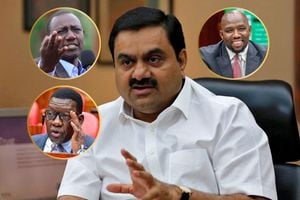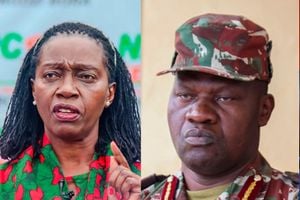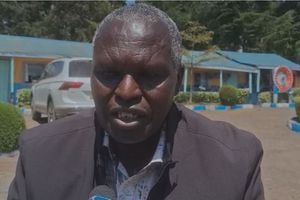FKF should conduct elections in line with its constitution

President of Football Kenya Federation Nick Mwendwa.
What you need to know:
- Article 27 of the FKF Constitution provides that FKF elections shall be conducted by an independent electoral body.
- Section 3 of the Electoral Code establishes the electoral board and its composition.
Football Kenya Federation (FKF) elections are due in a couple of months.
It is important to note that the office mandate of the current FKF delegates expire in September for the branch chairmen, and in October for members of FKF’s National Executive Committee (NEC).
On August 9, FKF released a formal convocation notifying members of an intended Special General Meeting (SGM).
Among the agenda items for the planned SGM is a vote by members on the adoption of the Electoral Code that will govern the planned elections of the federation. Notably, FKF circulated a document titled “Electoral Code of Football Kenya Federation 2019/2020” together with the agenda for Saturday’s SGM
On March 17, 2020, the Sports Dispute Tribunal in Tribunal Case No. 3 & 5 of 2020 (Football Kenya Federation vs Sports Registrar and 64 others) declared specific sections of “Electoral Code of Football Kenya Federation 2019/2020” null and void, and the decision has never been appealed nor set aside by any court or tribunal.
Legitimacy of electoral process
The tribunal stated as follows: “The purpose of competitive elections is to offer voters a choice between different philosophies, manifestos and visions so that they can decide who their leaders will be for the term as defined in the constitution. When such a choice is taken away from the voters, then it cannot be said that the ascendancy into office of the sole candidate who meets that criteria is legitimate. For this reason, the Tribunal has no hesitation in striking down the provisions of section 4 of the Code as being unreasonable and designed to lock out potential aspirants and is a gross violation of the principle of free and fair elections contemplated by Section 46 (6) of the Act as read with paragraph d of the Second Schedule to the Act and Article 81 of the Constitution of Kenya 2010. Clearly, the eligibility criteria set out in the Electoral Code finds no support in either the Constitution of Kenya, the Sports Act or the FKF Constitution 2017 and is accordingly null and void.”
The “Electoral Code of Football Kenya Federation 2019/2020” that FKF circulated to its members on August 9 still had the sections that the Sports Dispute Tribunal had declared null and void for being unconstitutional.
This brings into question the legitimacy of the electoral process and casts a doubt on the achievement of the principles of a free, fair, verifiable and credible election as set out under Article 81 of the Constitution of Kenya 2010. The FKF Electoral Code 2019/2020 mandates the Electoral Board with the responsibility of managing and conducting the elections of FKF.
Article 27 of the FKF Constitution provides that FKF elections shall be conducted by an independent electoral body. Section 3 of the Electoral Code establishes the electoral board and its composition. It is composed of the Chairman, Secretary and at least three other members.
However, the electoral code as drafted grants the General Secretary elaborate roles in the electoral process which brings into question the impartiality and independence of the Board in the conduct of its affairs.
Free and fair election
Specifically, Section 3 (1) (c) grants the General Secretary the authority to attend board meetings albeit in an advisory capacity. Other instances include: Section 3 (1) (h) - The FKF GS shall whenever required by the Electoral Board, assist and carry out administrative tasks for the Electoral Board; Section 3 (2) (g) - The Electoral Board may decide to also supervise sub-county elections by requesting one or more of its members to carry such task. In the event that no member (s) of the Electoral Board are available to supervise these elections, such task may be entrusted to the FKF General Secretariat; Section 6 (C) - The General Secretary shall put the ballot papers that have been collected and counted into envelopes intended for this purpose and seal them immediately. The GS shall keep these envelopes and destroy them 100 days after the end of the General Meeting; Section 3 (1) (g)- The headquarters of the Electoral Board shall be the same as the FKF Headquarters, unless the Electoral Board itself decides otherwise.
The direct involvement of the General Secretary in the affairs and conduct of the elections by the electoral board does not guarantee a free, fair, credible and impartial election conducted by an independent body. The elaborate roles granted to the General Secretary amount to a breach of independence and also creates a potential risk especially where the person holding the office at the time is a candidate in that election.
In order to prevent potential breaches, the proposal by members is as follows: The Secretary of the Board takes over all the roles that have been granted to the General Secretary; The headquarters of the Board be changed to prevent any potential interference in the running of its affairs; The Board invokes Section 3 (2) (f) and appoints an independent body, institution or individual to conduct the entire elections, preferably the Independent Electoral and Boundaries Commission (IEBC).
With the above interventions, the principles envisaged under Article 81 of the Constitution of Kenya 2010 and Section 46 (6) as read together with the Second Schedule of Sports Act 2013 will be achieved and a credible, impartial, verifiable, free and fair elections guaranteed. Additionally, the government should indulge all the relevant stakeholders in order to safeguard the principles set out under article 81 of the Constitution of Kenya 2010.
All that is needed is a credible and verifiable election. Whoever wins is neither here nor there so long as they are elected in a free and fair manner and have the growth and prosperity of Kenya football at heart. The progress our neighbours are making should not bode well with the football fraternity. We need to get done with the elections and focus on giving the young boys and girls a future worth dreaming and working hard to achieve.





